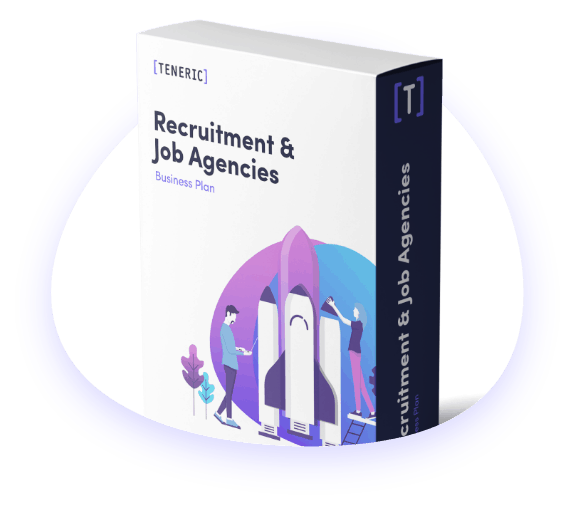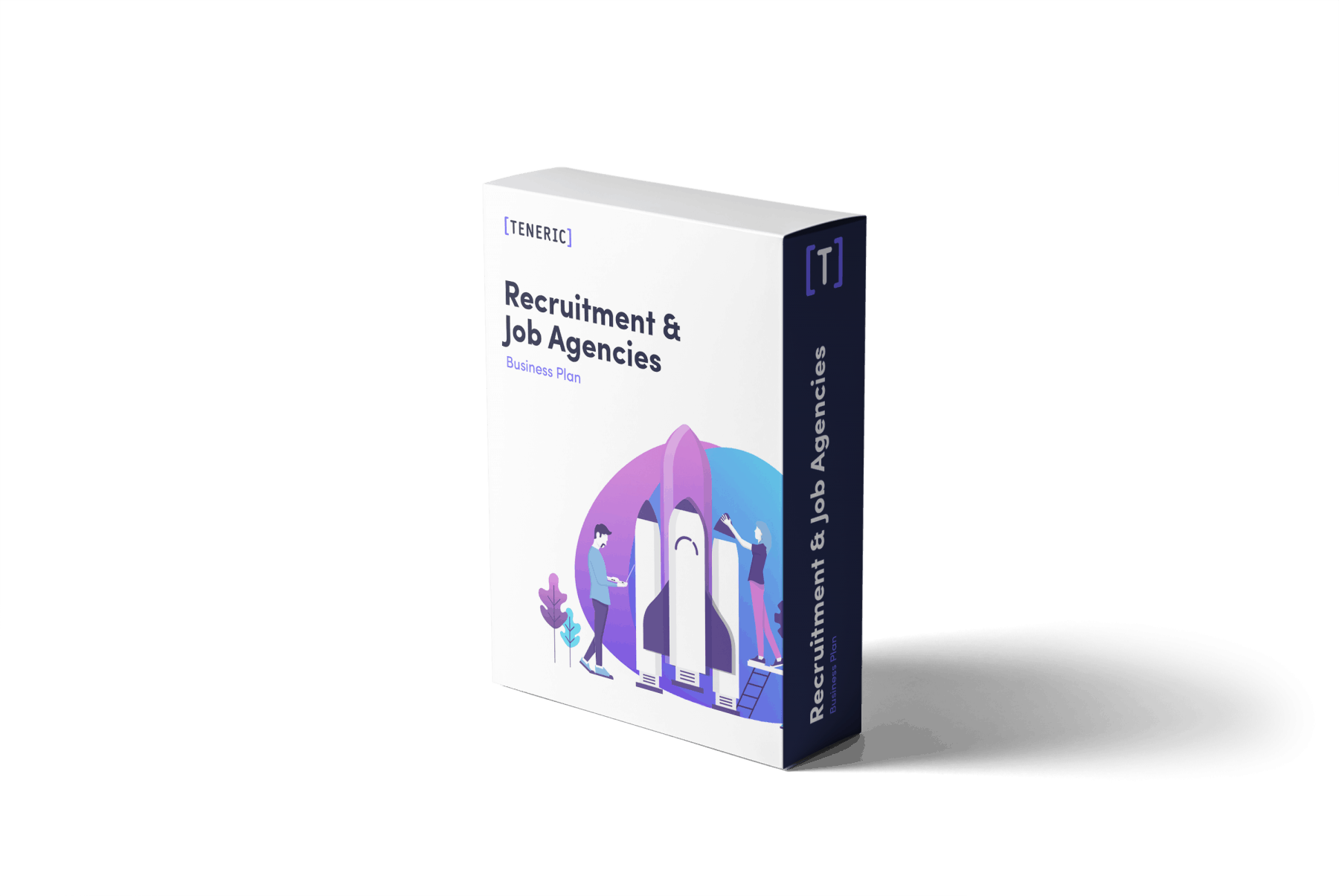Striking out and setting up your own recruitment agency is an exciting prospect, and there’s never been a better time to do it. With over 31,000 agencies in the UK, the recruitment industry is booming. Despite the profound impact of COVID-19 on the labour market, recruitment is projected to bounce back massively in 2024, so now is the perfect time to seize the opportunity and open your own agency.
Pre-pandemic, the recruitment industry generated over £42.3 billion in the UK alone, and recruitment agencies and firms are predicted to grow substantially in the next 3-5 years.
It’s clear that there is huge revenue potential in the recruitment industry. However, to stand out from the crowd, you’ll need a great recruitment agency business plan. This will give you the strategy and understanding of the industry you need to succeed.
So, where should you start? Our guide will take you through each individual step in making your own business plan. We’ll take you through marketing strategy, pricing structure and management, all of which are crucial to the success of your recruitment agency. As a new business owner, there will be a lot to take in, but with our recruitment agency business plan, you’ll have the ultimate guide to take you forward.

As we’ve already mentioned, there is great potential in the UK for recruiters, and the turnover could be really significant. However, with the popularity of the industry comes a lot of high level competition.
Before you do anything else, you should be clear on who your competitors are, who your clients will be and how you will reach them, as well as fees you might have to pay whilst setting up.
You should start with a business plan. You can use it to gather and collate all of your resources, ideas and research.
The average start-up costs to set up a recruitment agency in the UK vary considerably. More expensive start-ups will cover the costs of leasing premises, employing staff, buying equipment and any insurance you might need.
However, there are ways to set up a recruitment agency without having to pay out thousands at first. By starting out as the sole employee, and even working from home, you can reduce costs to a bare minimum. All you really need is your home PC, mobile phone, some basic web tools and an internet connection.
With this in mind, a recruitment agency business plan is the best way to prepare yourself and plan for any financial obligations from the very start. We can also help you to figure out how to raise the capital you need for your business, based on your current financial situation.
We’ll take you through every step you’ll need to take to start your recruitment agency. It’s important to remember that if you plan to secure funds from a bank, it’s essential your business plan is as rigorous as it can be.
Along with that, we’ll offer you a further 25 (at least) ways to market your recruitment agency for free. All of this is at your fingertips.
In this guide, we’re going to take you through an outline for a recruitment agency business plan, detailing what you should include within each section, and things you should consider when pitching your business to investors.
However, please remember this is only a guide. When writing your business plan for your own recruitment agency, make sure to take your time and work through everything in scrupulous detail.
When it comes to a business plan, the more thorough the better. You can never over-plan when it comes to a business start-up.
Imagine you are pitching your business to an investor, what would you say? Remember that banks and investors will have seen thousands of previous pitches, so you really need to stand out to grab their attention. Putting serious thought and effort into your executive summary will be well worth it.
Remember, this is your opportunity to convince investors of your business’ credentials. Keep it positive, clear and easy to understand. Don’t get drawn into detailed descriptions or explanations, and avoid technical terms and jargon. Go out and grab their attention.
The company overview is your chance to properly introduce yourself and your business. You can give your potential investors a more detailed insight into how you plan to make sure your recruitment agency is a success.
Always remember, your focus should be on why investors should choose to put money into your recruitment agency, and why they should believe they’ll make a return on their investment.
You need to show that you have a good understanding of the recruitment industry. Let them know the extent of your knowledge of the current market, how you expect it to change, and how your company is suited to thrive in the future.
You should think like a business person and don’t give your investors any reason to doubt your command of the subject.
Basically, the goal of your company overview is to deliver a complete outline of your recruitment agency to your potential investors. Make sure to include facts and figures, and show off all your skills and expertise.
Feel overwhelmed? Not sure where to start? We’ve done all of the hard work for you.
A business is only as good as the people behind it. To really make your recruitment agency a success, you’ll need the support of a great team. In the management and key personal section of your plan you should detail your management, staff, and plans for further growth.
This section really doesn’t need to be too long or complicated. All investors want to know is that you have a solid management structure and that you’ve made some plans for expansion in the future where necessary. As long as you’ve shown this, you’ll be just fine.
It’s crucial to have a strong understanding of your market before launching your start-up. It will help you recognise opportunities for your company to benefit from, and identify threats before they can damage your business.
Make sure you know the competition. What will make you stand out from them?
In this section you’ll also need to look into your target market, and how you’ll attract them over the competition. You should try to make this as detailed as possible, so that investors can see the focus of your agency. Being too vague might lead potential backers to believe you haven’t put much thought into it.
Are you going to focus on recruiting in one particular industry? Or perhaps you’re going to specialise in junior or graduate roles? You need to know who your clients will be so you can tailor your marketing and branding to suit them.
In order to attract business you’ll have to stand out from other recruitment agencies that operate in the same region. How do you plan to separate yourself from your competition? Investors might be concerned about market saturation, and you need to prove to them that your agency has more to offer than any other around you.
Put yourself in the shoes of your ideal customer. What is going to make them choose you over another agency?
Your business is going to need to have objectives, both for the short term and the long term. These objectives should be an outline to potential investors of what you are expecting to achieve over a time-frame.
Think about where you want your company to be after a month, then six months, a year and even five years. Don’t go crazy though. Ambition is good, but you shouldn’t be suggesting your business is going to become a giant of the industry after the first couple of years, as you will just come across as naive.
You should try to use the S.M.A.R.T criteria to keep track of your objectives.
If you still need some help coming up with objectives, you can consider some of the following:
Along with each objective you should provide a plan, as to how you expect them to be achieved.
By giving a detailed list of all the equipment you need to start your recruitment agency, investors will be able to see what their money is paying for.
This will depend very much on the scale of your planned agency. It would be possible to start by working from home with just your home PC and personal mobile phone. But if you’re thinking bigger, some items and services you should think about would include:
Be realistic in this section. You don’t need twenty PCs if you’re only employing a handful of staff. There’s no point in overspending.
This is the section where we crunch the numbers. Financial forecasting is probably the most important part of your business plan, as you can prove to investors that they will get some return on their investment.
This might be the trickiest and most time consuming part of the whole plan, but it is essential to do it properly.
You’re going to have to show your potential backers how you’ll recuperate the money they’ve invested. How much can you make per client? How many clients will you have?
If possible, don’t restrict yourself to just one avenue of revenue. Diversifying your income sources will make investors feel much more comfortable with their investment.
We’ve taken all of the hard work out of planning the finances for your recruitment agency. Download your recruitment agency business plan template instantly below.
Do you already have existing financial support? Your investors will need to know how much start-up capital you have, and where it’s coming from. You need to let them know whether you’re using money from your own pocket, or whether you have investments from some other backer.
Be completely clear about where your money is coming from. Don’t hide anything from your investors.
You also need to be explicit about how much money you need, both now and in the future. You should also detail to investors how you’ll be spending it, whether it’s for equipment, renting premises or paying staff.
At the same time, don’t ask for more than you need, as it’s only likely to put investors off
If this is all still seeming a bit overwhelming, you might like to take a look at a small template we provide for a recruitment agency business plan. This can get you started and help you to come up with some of your own ideas.
Launching your own business is a scary prospect. The recruitment industry is already a busy market, but there’s plenty of demand for it and forecasts anticipate its boom to continue. There are over 31,000 recruitment agencies in the UK, with a combined value of over £42.3 billion.
By creating a detailed and clear business plan, you’re giving yourself the best chance of success. You’ll be able to start out knowing you’ve considered every aspect of the business. Investors love an in-depth business plan, so remember: the more detail the better. With our experience, you can kick-start your agency with confidence.

Complete recruitment agency business planning package.
£49
Instant Online Download